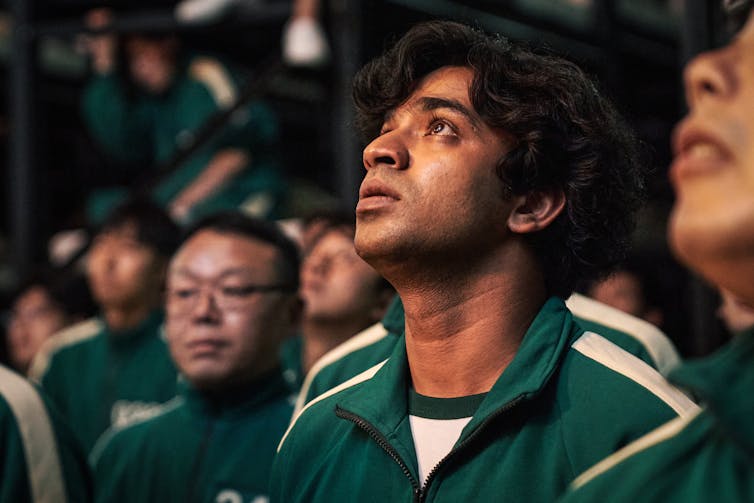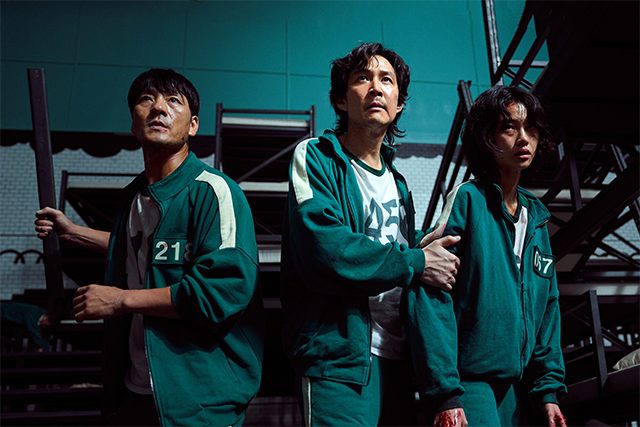There is no question that Squid Game has become a global sensation. Since its release, the nine-episode survival drama has topped Netflix’s charts in 90 countries and is poised to become the most-watched show in Netflix history.
As the global popularity of the Korean thriller continues to grow, there have been debates over the quality of the English subtitle translation, particularly on social media. Many people who claim to be English-Korean bilinguals argue the translation does not do justice to the brilliantly written stories, clever dialogue and script. Some even argue that if you have watched the show in English, you haven’t really watched it at all.
Spoilers for Squid Game season 1 follow.
Subtitling is not easy
As someone who specializes in English-Korean translation and interpreting, I believe the ongoing debates on the English subtitles of Squid Game are missing some important elements.
Not many people know the difference between translation and interpreting. To put it simply, translation refers to rendering of written texts from one language into another, whereas interpreting refers to spoken language.
Subtitling falls between translation and interpreting, because a subtitler listens to spoken language just as an interpreter does, and translates the oral language into written form for viewers.
Subtitling requires not only bilingual competence but specific skills essential to deliver messages within a limited space on screens. Think about the famous quote by the Oscar-winning director of Parasite, Bong Joon-Ho:
Once you overcome the one-inch-tall barrier of subtitles, you will be introduced to so many more amazing films.
It is a subtitler’s job to find ways to condense messages into the one-inch-tall slots, no matter how long or complicated the original dialogues are. As you can imagine, subtitling is not easy.
Subtitling becomes even more complicated when cultural factors come into play, because many culture-specific words and concepts are difficult to translate.
“The untranslatable” exists in all cultures, and in the case of the Korean language, words such as aegyo sometimes described as “performed extreme femininity”, han likened by some to “a mix of sorrow and sadness accumulated from a series of life experiences” and jeong described sometimes as “deep connection and emotional bond that builds over time”, are some of the most well-known concepts that have no direct equivalent in another language. In literature translation, there are ways to deal with the untranslatable through footnotes or annotations, for example.
These strategies, however, do not work for subtitling due to the space constraints, so managing culture-specific elements is perhaps the most challenging aspect of subtitling.
The Untranslatable in ‘Squid Game’
Comparing the Korean language with the English subtitle translation of Squid Game, occasional minor omissions and distortions are apparent — but the overall quality of the translation is, in my opinion, fine.
Most of the controversies seem to centre around the English closed captions, which are very different from the English subtitles on Netflix. The English captions which appear as “English [CC]” are for people who cannot hear audio, so they include non-verbal descriptions such as the background music and sound effects. Translations in closed captions are, therefore, more concise than subtitles and are limited in terms of meaning delivery.
Despite the good quality of the English translation, a meaning gap inevitably exists between the original Korean and the English subtitles due to the untranslatable.
Perhaps the most significant aspect of the untranslatable in Squid Game relates to “호칭” or “honorifics” which Korean people use to refer to each other in conversation.
An age-based hierarchy is a key characteristic of Korean society, and people do not call each other by name unless they are friends of the same age. One of the most common honorifics is “형 (hyung)” or “older brother”, a title a younger brother uses to talk or refer to his older brother. This expression is often also used by non-family members who are close to each other to indicate the degree of mutual friendship.

Netflix
If you have watched the drama, you might recall Ali, the Pakistani laborer, who came to South Korea to earn money. Ali got to know another participant, Sang Woo, a graduate of Korea’s top university, who embezzled a huge amount of money at work and was determined to win the game to get rid of the debt.
As they became close to each other, Sang Woo suggested that Ali call him hyung, instead of “사장님 (sajang-nim)” or “Mr Company President”, one of the first terms that foreign labourers in South Korea pick as a result of spending most of their time at work under often exploitative bosses.
The moment that Sang Woo became Ali’s hyung is one of the most humanistic moments in the gory drama. The poignancy of the moment, however, could not be fully delivered due to the absence of an equivalent English form. In the English subtitle, the line “Call me hyung” was translated as “Call me Sang Woo”.
When Sang Woo later betrays Ali in the game of marbles, the kinds of emotions experienced by viewers who are able to understand the degree of intimacy attached to hyung compared with those unable to do so may, therefore, be very different.
Scenes like this show, in a powerfully raw form, the cruelty and selfishness of human beings in real life, albeit in a different kind of “game”.
There are other untranslatable honorifics, such as “오빠 (oppa)”, which was translated as “baby”, and “영감님 (yeonggam-nim)”, which was translated as “sir”. Close, but not quite the same.

Netflix
Beyond language barriers
Understanding the honorifics in Squid Game is important to fully capture the bitter aspects of human relationships.
Considering the untranslatable, the recent addition of 26 Korean words to the Oxford English Dictionary is a welcome move. Interestingly, some of these newly added words include common honorifics such as noona, oppa and unni, and I hope that this paves way for the inclusion of more Korean words in the future.
While translation and interpreting serve as an important cultural and linguistic bridge, the gap left by the untranslatable can only be filled by genuine understanding of the other culture and language.
Building on Director Bong’s message, once you overcome the gap left by the untranslatable, you will be introduced to so many more amazing films.![]()
Jinhyun Cho, Senior Lecturer in Translation and Interpreting at Macquarie University, Macquarie University. This article is republished from The Conversation under a Creative Commons license. Read the original article.
RELATED: Netflix hit show ‘Squid Game’ spurs interest in learning Korean









